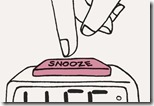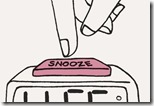Hey, look, a recruit. Now that the drought...
So the Spring Game is in a week. What should we be looking...
You have heard tell of the Beilein Factor, a bracket variable mathematically expressed as " " that allegedly extends the tourney life of Beilein-coached teams. Do you believe in
" that allegedly extends the tourney life of Beilein-coached teams. Do you believe in  ? What causes
? What causes  ? Is it more dangerous to meet a
? Is it more dangerous to meet a  -factor team where
-factor team where  's time to prepare for you > 5 days, or is the converse true, wherein <2 days to prepare for
's time to prepare for you > 5 days, or is the converse true, wherein <2 days to prepare for  = greater chance of tournament death?
= greater chance of tournament death?
-------------------------
Brian: We are dealing with small sample sizes here, but since it's all we have to go on... yeah, there does seem to be something about meeting John Beilein in the tournament that makes things go poorly for their opponents.
 |
| Theory: If you'd never seen the 1-3-1 and were expecting to play the Mountaineers' 1st round opponent, it can be tough to crack it in 2 days of practice. [Courtesy WVU Sports Communications] |
Before his Michigan days, you could chalk that up to the weirdness of coming up against the 1-3-1 zone. The easy theory was that conference opponents had a grasp on how to attack it and few others did. Ditto getting Pittsnogled. While it's more common these days, a decade ago the specter of a 6'11" guy raining on you was enough to create a verb.
These days Beilein runs man to man and Dirk Nowitski exists, so big guys who can shoot are just uncommon, not insane. I mean, MSU--the platonic opposite of Beilein basketball--has two bigs who shoot threes. And yet, Beilein has taken Michigan to the tourney five times, solidly exceeding expectations three of those times with one first-round upset and the fifth still pending.
The reasons are a bit more obscure these days, other than the usual "John Beilein is a genius seriously" tag. The general difficulty of getting everything covered in Beilein's offense of cuts and reads and options is a large part of it, of course. The other part is player development. Michigan guys get a lot better, and while the leaps are most notable between seasons that unusual rate of improvement is happening throughout the year. Michigan teaches constantly, and by the end of the year they're incrementally better than the teams they played early in the season are.
That's my best guess, anyway.
[Jump for more guesses]
-------------------------
BiSB: In the words of Col. Nathan Jessup, my answer is that I don't have the first damn clue.
The last couple of years suggest that the two-day turnaround is what really allows Beilein to thrive, with the second matchup of the weekend producing the more eye-popping performance (VCU, Florida, Texas).
 |
| As we saw with VCU and Cuse last year, Beilein certainly knows how to break down a weird team given time. [Dustin Johnston|UMHoops] |
But in '10 and '12, it was the opening game performance that was more impressive. And if Michigan has to face Syracuse on two days notice last year, the Mitch-McGary-in-the-high-post offense doesn't get installed in time and Michigan probably struggles. I suppose the argument could be made that because Michigan relies so much on outside shooting, getting a team comfortable in a venue allows them to get into the kind of Death From Above groove that makes them nearly unbeatable. The Ohio State BTT game might give some credence to that theory, as they briefly became assassins (before the State game left them with no legs).
Looking back at last year's run, one thing seems at odds with my memory: for the first two weeks, Michigan's offensive output was almost flat. It was the DEFENSE that improved markedly in the second matchups. Maybe Beilein doesn't have enough defensive wrinkles to keep anyone from figuring them out given enough time, but he has enough tricks up his sleeve to break serve just enough for his offense to land a couple of huge blows. The opponent will figure some things out later, but at some point the opponent will have to break serve back, and that's tough against this squad.
My best guess: B is more of a constant added into any equation, rather than a time-dependent variable. Beilein can take a 50/50 proposition and put a finger on one side of the scale by making a couple of pre-game adjustments, and holds that advantage by being as good the opposing coach in terms of in-game stuff. It may not be much, but it's enough to make Michigan phenomenally dangerous given the talent he's working with.
-------------------------
Seth: I agree with Brian that we're looking at a lot of different individual effects that have gotten Beilein teams past various tourney opponents over the years. A short history of his eight tournament appearances:
 |
| Basically he's just a good coach. [Canisius Athletic Communications] |
- 1996: With his MAAC Player of the Year injured he took Canisius to the conference final and earned the school's first bid, where they got plastered by 4-seed Utah.
- 1998:Upset 3-seed South Carolina then lost to 11-seed Washington in the 2nd round as the Huskies continuously fed their 7'0/280 center Todd MacCulloch (31 pts, 18 rebounds, 2 TOs)
- 2005: This was WVU's run to the Elite 8 with the 1-3-1 and Gansey and the Pittsnoggling. They barely escaped 10-seed Creighton in the 1st round. The 2nd round was that legendary game with #2 Wake Forest when WVU put up 50 points in the 2nd half and won 111-105 in double-OT. They then beat Texas Tech largely thanks to a 56% eFG, and took 4-seed Louisville to OT in the Elite 8 by shooting 18/27 from three.
- 2006: Year 2 of the Pittsnoggling when they made the Sweet 16. Beat 11-seed Southern Illinois and caught 14-seed Northwestern State (who'd upset Iowa) in Round 2. Lost to 2-seed Texas despite a late run.
- 2009: Upset Clemson in the 1st round by feeding Manny and playing stout defense, notably holding their 3-point specialist Terrence Oglesby to just 1/7 from three and 3 total points. Got Blake Griffin'd in the 2nd round.
- 2011: Crushed 9-seed Tennessee on Darius Morris's 9 assists. Took top-seed Duke to the wire.
- 2012: OHIO! (not THAT Dayton)
- 2013: Crushed overmatched SD State (not THAT SDSU), deployed Burke/Spike/Hardaway ballhandling to put on a VCU-beating clinic, WE HAD SUBS IT WAS CRAZY, dominated Florida when Stauskas (6/6) and co. shot the lights out, defeated Cuse's 2-3 zone by developing the McGary in the High Post method, lost to Louisville in a shoot-out.
There isn't one solitary factor. It's a lot of developing and deploying his talent in different ways to defeat the other team's talent, and boils down to "Beilein is good at coaching basketball."
The big run last year had a lot to do with Michigan peaking late, and that has to do with a young team that full of talent, and Beilein and staff's ability to development it over the course of the season. The corollary of a lower seeded team making a tourney run is that they weren't an elite team during the season. In Michigan 2013's case, the Stauskas sniping that defined the team in its nonconference schedule was just a tertiary bonus of a great guard/center with complementary pieces thing by the end.
That effect is what's largely at play this year: gradual improvement as their young players mature. Derrick Walton looks far more comfortable, Zak Irvin is slowly becoming a bigger part of the offense, LeVert has settled into his role, GRIII is in his best personal stretch ever, and they're getting every ounce of game from Jordan Morgan.
-------------------------
Ace: I think the only Beilein factor that hasn't been mentioned so far is how much he controls the arc of player development so his teams peak in the postseason. Part of that is simply due to his ability to construct a roster—players like Darius Morris, Tim Hardaway Jr., Caris LeVert, Mitch McGary, and even Nik Stauskas were able to develop in less-demanding roles (at least offensively) before stepping to the forefront.
 |
| Learning how to handle the rock is an underappreciated step in the development of Beilein's shooters. [Upchurch] |
His management of the in-season rotation adds to this. Look no further than last season, when McGary went from a backup playing less than half the team's minutes during the regular season—while playing his way into shape and getting used to the college game—to a fully unleashed 30-mpg starter in the NCAA Tournament. It would've been easy to hand McGary, the program's most hyped recruit in a long time, the starting job from day one, ready or not. Instead, Beilein prioritized the postseason, saved McGary's legs, and in the process got him on the right development track to be a remarkably effective player when it was his time.
We're seeing similar, albeit less dramatic, developments in the roles of the young players this season. Zak Irvin's playing time has increased over the course of the season, and he's become comfortable in the bench gunner role even though his skill-set should have him doing a fair amount more than that next year. Stauskas's and LeVert's ability to handle the ball—cultivated by Beilein and the staff—allowed them to bring Derrick Walton along at the right pace; while he's been the starter from the get-go, he's less a pure point guard and more of a spot-up shooter in the offense this year, which is ideal given the talent on the roster. Both freshmen settled fully into those roles in the latter part of conference play—just the right time to gear up for a tournament run.
In addition to what's been said by everyone else, Beilein's roster management—both from year-to-year and over the course of a given season—gives his teams and advantage over coaches who don't have the foresight or the luxury to manage their rotation with one eye focused on the postseason.

